This post may contains affiliate links. Read our full disclosure here.
Ever found yourself frozen while staring at a restaurant wine list, wishing someone could guide you through those mysterious grape varieties and regions? That’s exactly what a sommelier does! What is a sommelier, exactly? They’re the wine wizards who transform dining experiences from ordinary to memorable with their extensive knowledge. These trained professionals decode wine mysteries for everyday wine lovers and experienced enthusiasts alike, making wine more accessible and enjoyable for everyone.
As someone who worked in a wine bar during college, I’ve witnessed firsthand how a great sommelier can completely transform someone’s relationship with wine. What is a sommelier’s true value? They’re not just fancy wine servers – they’re educators, guides, and the friendly faces who help you discover your next favorite bottle without any wine snobbery involved.
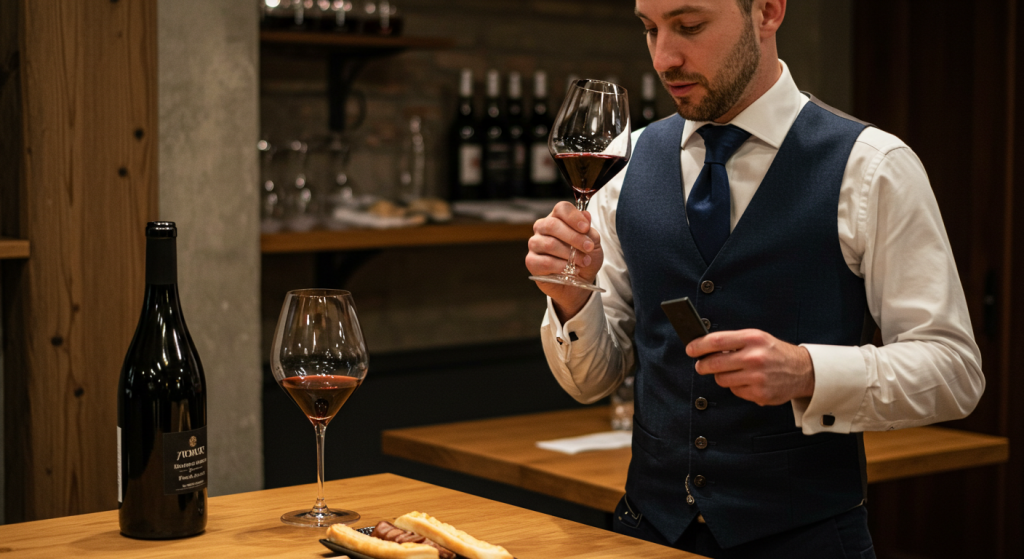
What Is a Sommelier? Understanding the Role
A sommelier is a professionally trained wine service specialist who has extensive knowledge about wine varieties, regions, production methods, and food pairings. The sommelier meaning goes far beyond just serving drinks – they’re curators of the entire wine experience. They study for years to develop their palate and knowledge, often pursuing rigorous certification programs to perfect their craft.
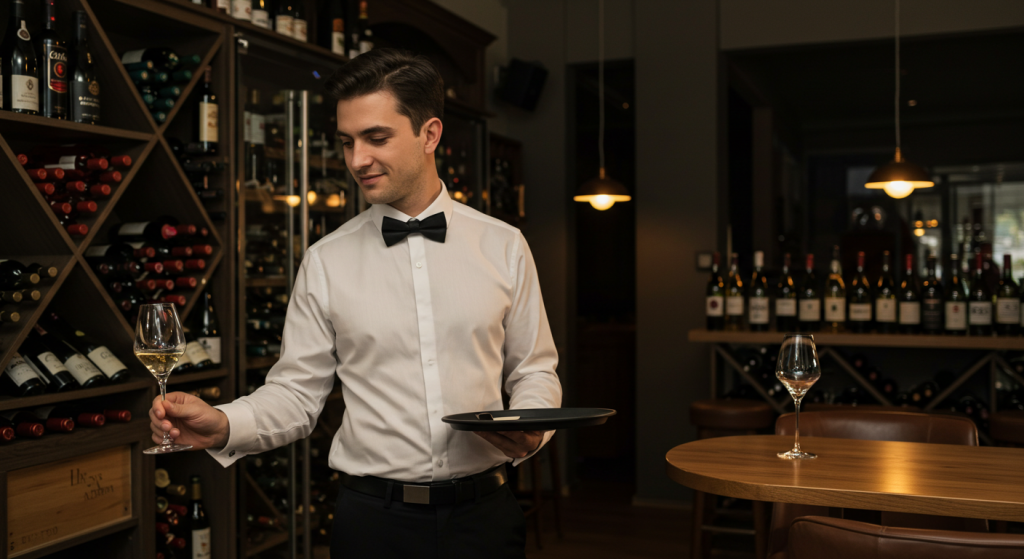
You’ll typically find these wine professionals in various settings where wine knowledge adds significant value:
- Fine dining restaurants – Creating wine lists and recommending perfect pairings
- Luxury hotels – Managing extensive cellars and training staff
- Wine bars – Guiding customers through tastings and selections
- Private events – Designing specialized wine experiences
What sets a sommelier apart is their ability to translate complex wine concepts into approachable recommendations. They help you navigate wine classification systems without feeling intimidated. Whether you’re a complete beginner or an experienced enthusiast, they meet you at your level of understanding and enhance your appreciation for what’s in your glass.

What Does a Sommelier Do? Daily Responsibilities
What does a sommelier do beyond just pouring wine? Their role is surprisingly diverse and goes far deeper than most people realize. On any given day, a sommelier might taste dozens of wines, manage inventory worth thousands of dollars, train staff on new additions to the wine list, and create memorable experiences for countless guests.
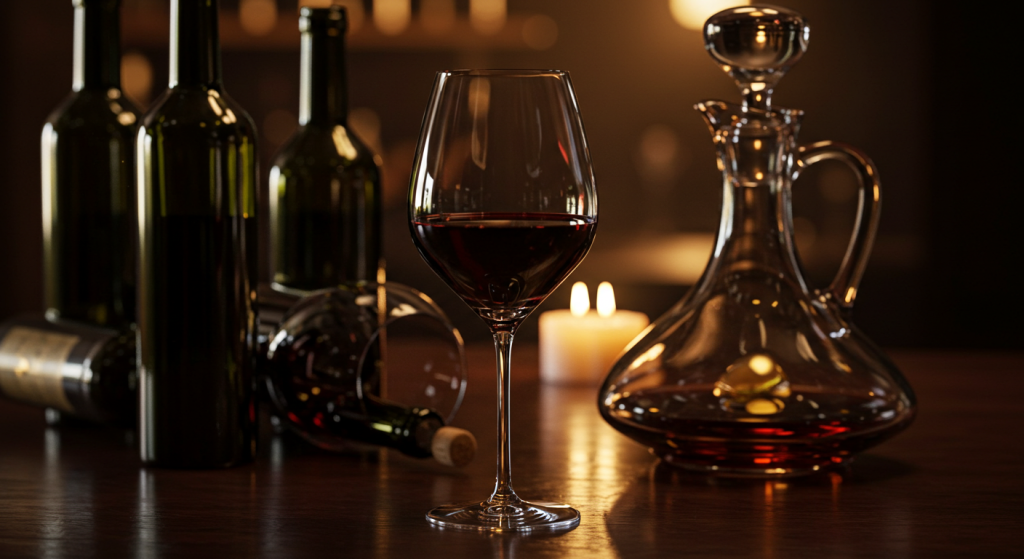
A sommelier’s core responsibilities typically include:
- Curating wine programs – Selecting bottles that complement a restaurant’s food menu
- Providing tableside service – Opening, decanting, and serving wines properly
- Creating food pairings – Understanding which wines highlight specific flavors
- Educating guests – Explaining wine characteristics in accessible terms
- Managing inventory – Tracking stock and ensuring proper storage
Here’s a real-life example of what is a sommelier’s impact: Last month, my boyfriend and I celebrated our anniversary at a nice restaurant. When I mentioned I usually enjoy red wine but was ordering fish, the sommelier suggested an oaked Chardonnay that completely changed my perspective on white wines. That’s the kind of personalized guidance that makes understanding food and wine pairing fundamentals so much easier!
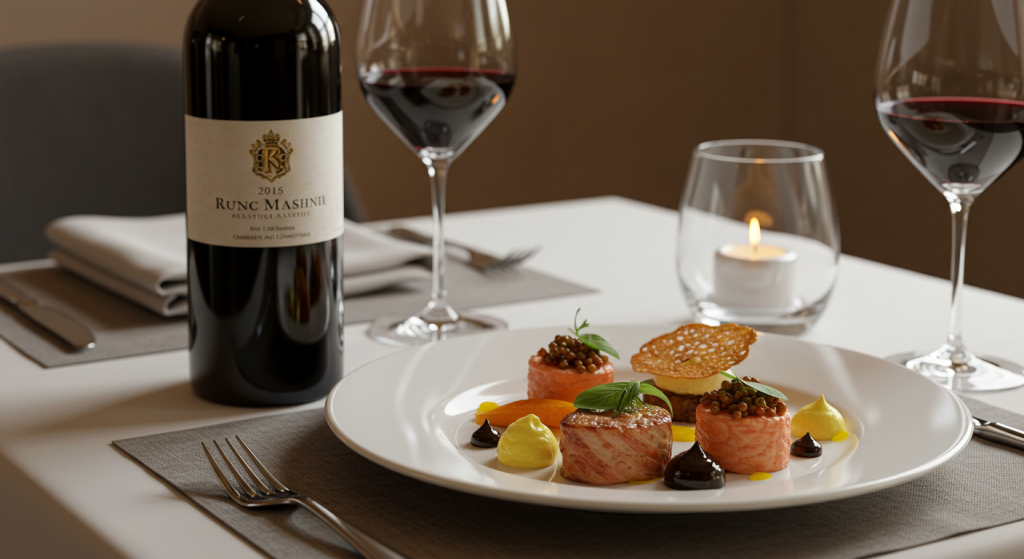
Sommelier vs. Wine Steward vs. Wine Expert: Spot the Difference
Not everyone who works with wine holds the sommelier title – understanding the differences helps clarify what is a sommelier compared to other wine professionals. While these roles sometimes overlap, they each have distinct qualifications and responsibilities that set them apart.
Here’s how to tell them apart:
- Sommelier – Formally certified professional with rigorous training through recognized organizations
- Wine Steward – Manages wine service but may lack formal certifications; often focuses more on service than education
- Wine Expert – May have extensive knowledge but without professional certification; includes enthusiasts, critics, and self-taught professionals
The sommelier vs wine steward difference primarily comes down to formal training. A wine steward definition might encompass someone who handles wine service competently but hasn’t completed certification programs like the Court of Master Sommeliers or Wine & Spirit Education Trust (WSET).
The wine expert vs sommelier distinction is similar – while both may have impressive knowledge, a sommelier has verified their expertise through standardized testing and practical examinations. This ensures they can consistently provide accurate information and high-quality service. Learning wine tasting terminology is just one small part of their comprehensive education.

How to Become a Sommelier: The Career Path
Wondering how to become a sommelier yourself? The journey to becoming a certified sommelier requires dedication, a passion for continuous learning, and significant practice. The good news is that it’s more accessible than ever, with multiple certification paths available depending on your goals and interests.
The most recognized certification programs include:
- Court of Master Sommeliers (CMS) – Four increasingly difficult levels: Introductory, Certified, Advanced, and Master
- Wine & Spirit Education Trust (WSET) – Four levels focusing on broader wine knowledge and tasting skills
- International Sommelier Guild (ISG) – Multi-level program emphasizing practical experience
- Society of Wine Educators (SWE) – Offers the Certified Specialist of Wine (CSW) designation
The typical path toward becoming a master sommelier starts with entry-level positions in restaurants or wine retail where you can build practical experience. Meanwhile, you progress through certification levels, each requiring months or years of study. The pinnacle achievement – passing the Master Sommelier examination – is notoriously difficult, with a pass rate often below 10%.
What is a sommelier’s biggest challenge? Developing a trained palate takes thousands of hours of practice. Many aspiring sommeliers use systematic tasting methods, study groups, and flashcards to memorize wine regions, producers, and vintage characteristics. If you’re interested in starting this journey, consider exploring wine tasting tips to begin developing your sensory skills.
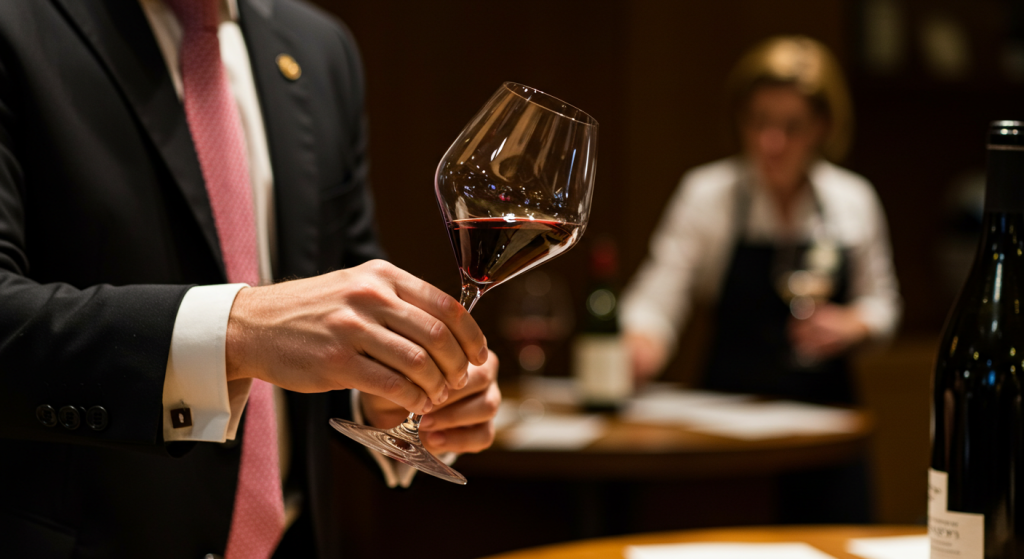
Fun Facts About Sommeliers You Never Knew
The world of sommeliers is filled with fascinating trivia that goes beyond what is a sommelier’s basic job description. These wine professionals lead lives just as interesting as the bottles they recommend!
Here are some sommelier facts that might surprise you:
- Blind tasting superpowers – Elite sommeliers can identify not just the grape and region, but often the specific producer and vintage year with just a sip
- The tastevin tradition – The small, shallow silver cup some sommeliers wear was designed to evaluate wine color in dimly lit cellars before electricity
- Palate insurance – Some master sommeliers insure their sense of taste for millions of dollars
- Constant studying – Even master sommeliers continue learning daily as new vintages, regions, and techniques emerge
The sommelier documentary “SOMM” offers a fascinating glimpse into the extreme pressure these professionals face during certification. It follows four candidates preparing for the Master Sommelier exam, revealing their intense study methods and sacrifices. The film demonstrates that what is a sommelier’s journey involves far more dedication than most people imagine.
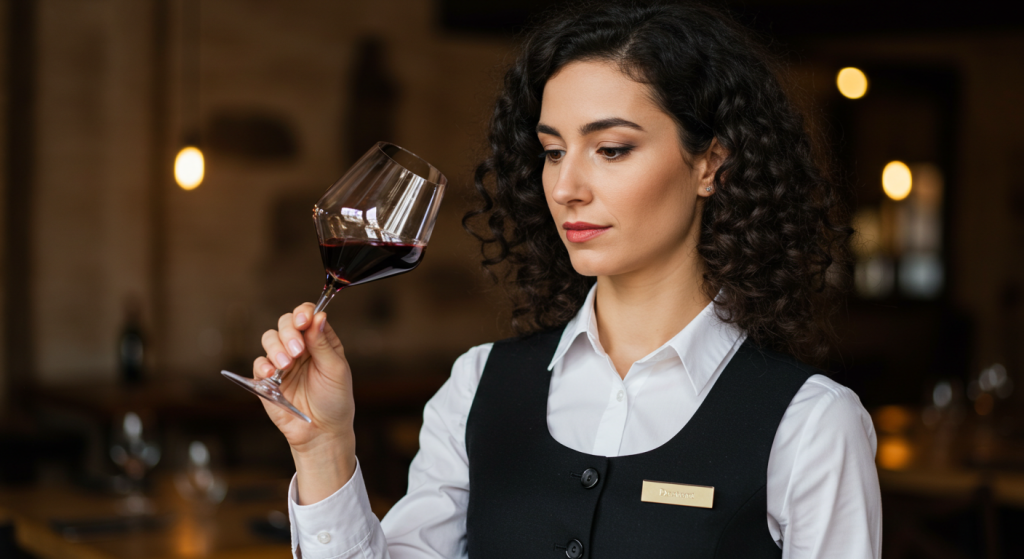
Famous sommeliers like Rajat Parr, Pascaline Lepeltier, and Bobby Stuckey have become celebrities in their own right, with book deals, TV appearances, and their own wine labels. Some have become influential voices in promoting sustainable and natural winemaking practices around the world. Looking for a firsthand experience with top sommeliers? Consider planning a trip to one of the many wine tourism destinations where you can learn directly from these experts.
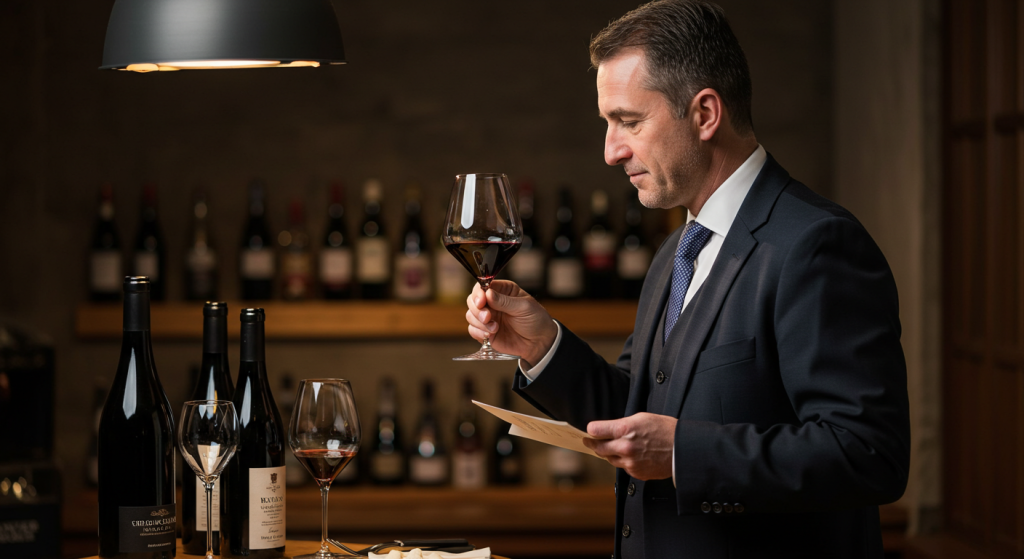
Why Sommeliers Still Matter in the Digital Age
In an era of wine apps and online reviews, you might wonder: what is a sommelier’s relevance today? Despite technological advances, sommeliers provide value that algorithms simply can’t match. They offer personalized recommendations based on subtle cues, body language, and conversation that no app could interpret.
Here’s why sommeliers remain irreplaceable:
- Human connection – They create memorable experiences through genuine interaction
- Contextual understanding – They can adapt recommendations based on mood, occasion, and companions
- Local knowledge – They offer insights about regional specialties and under-the-radar producers
- Immediate feedback – They can pivot suggestions based on your real-time reactions
Sommeliers excel at making wine accessible to everyone, regardless of budget or experience level. They take pride in finding incredible values that over-deliver for the price, not just pushing expensive bottles. The best sommeliers are masters at reading the table – knowing when to provide detailed information and when to simply make a quick, confident recommendation.
Sommelier FAQs: Your Burning Questions Answered
Do you tip a sommelier separately?
Usually, no. Your standard tip (15–20% of the total bill) is shared among the restaurant staff, including the sommelier.
However, if they went above and beyond — like guiding you through a complex list or offering a special tasting — it’s thoughtful to add 3–5% of the wine cost just for them.
How do I talk to a sommelier without sounding clueless?
Be honest and clear. Sommeliers love helping guests find the perfect match — not judging them.
Say something like:
“I usually enjoy [insert wine you like], and my budget is around [$X]. What would you recommend?”
They’ll appreciate your honesty way more than guesswork.
How do you pronounce “sommelier”?
It’s pronounced: suh-mel-YAY
(Emphasis on the last syllable.)
The word is French and originally referred to a court servant in charge of wine and supplies.
Are sommeliers only experts in wine?
Not at all. While wine is their main focus, many sommeliers are also trained in:
🍸 Spirits
🍺 Beer
🍶 Sake
☕ Coffee & Tea
Top-level certifications often include broad beverage knowledge — not just wine.
Can I ask a sommelier for a wine in my budget?
Absolutely. Sommeliers are trained to work within your price range — just let them know upfront. They won’t judge, and they often know hidden gems at every price point.
Will a sommelier help me pair wine with food?
Yes — that’s one of their main jobs. A good sommelier will consider your dish, personal taste, and even the mood of the evening to recommend the perfect pairing.
Do I have to take their suggestion?
Not at all. You’re never obligated to follow their recommendation. It’s totally fine to ask questions, request alternatives, or go with something you already know you like.
What if I don’t like the wine they suggest?
Let them know! Many restaurants will happily replace the bottle if it’s truly off or not what you expected — especially if the sommelier guided your choice. Just be polite and honest.
Do all sommeliers go through formal training?
Not always. Some sommeliers are certified through organizations like the Court of Master Sommeliers or WSET, while others gain experience working in wine-focused restaurants. Both paths can lead to excellent service.
What’s the difference between a sommelier and a wine director?
A sommelier typically works on the floor helping guests, while a wine director oversees the wine program — including inventory, purchasing, and training. In smaller restaurants, one person may do both.
Understanding what is a sommelier and how they can improve your dining experience opens up a world of flavor possibilities. Next time you’re at a restaurant with a sommelier, take advantage of their knowledge! Ask questions, share your preferences, and be open to new suggestions. You might discover your next favorite bottle and learn something fascinating in the process.
Wine should be joyful, not intimidating – and sommeliers are your allies in that journey of discovery. Whether you’re celebrating a special occasion or just enjoying a casual dinner, these wine professionals are there to make sure the right bottle finds its way to your table. Cheers to that!




